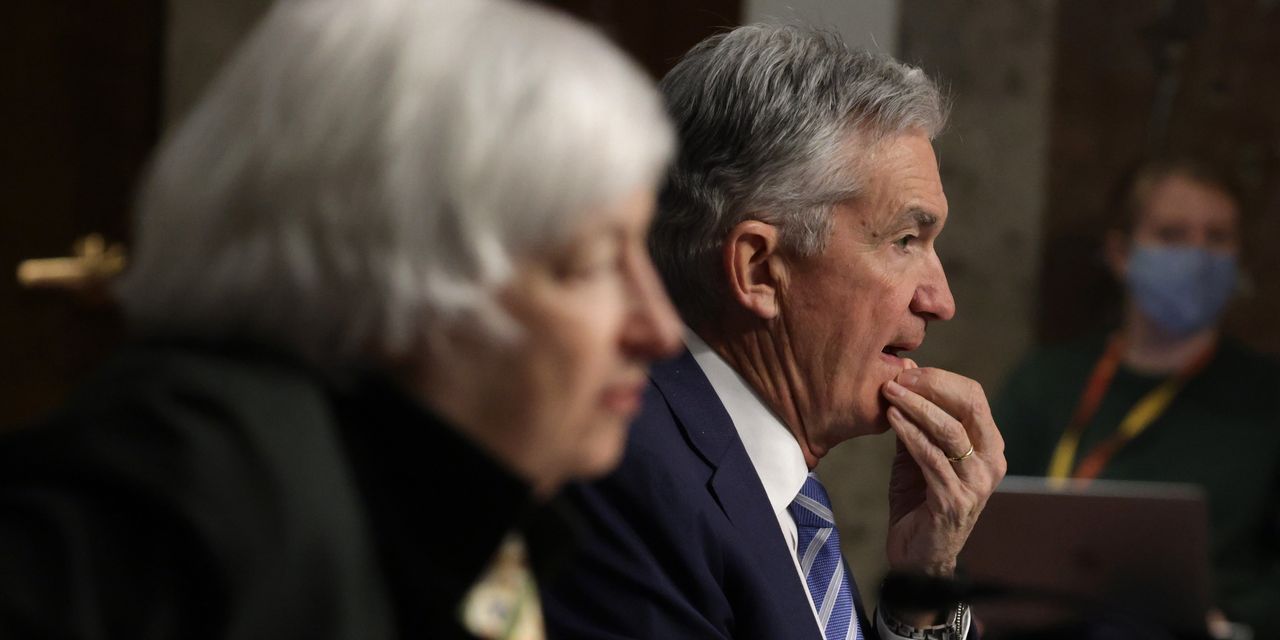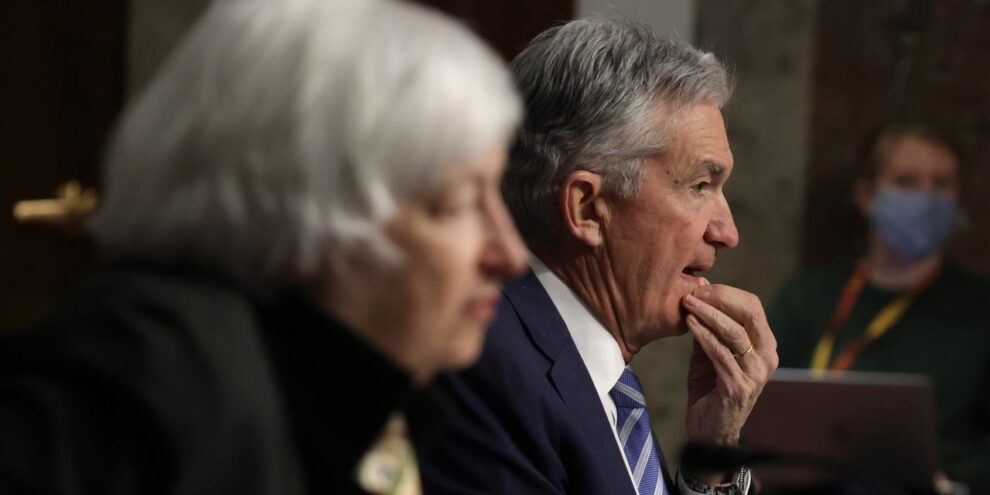
U.S. stocks fell Tuesday, with all three major indexes closing sharply lower, after Federal Reserve Chairman Jerome Powell told lawmakers it would be appropriate for policy makers to consider winding down monthly asset purchases more quickly than planned.
Equities were already feeling pressure after Moderna Inc.’s chief executive officer predicted that current vaccines would be less effective against the new omicron variant of the coronavirus that causes COVID-19.
How did stock indexes trade?
- The Dow Jones Industrial Average DJIA dropped 652.22 points, or 1.9%, to 34,483.72.
- The S&P 500 SPX fell 88.27 points, or 1.9%, to 4,567.
- The Nasdaq Composite COMP declined 245.14 points, or 1.6%, to 15,537.69.
- The small-capitalization focused Russell 2000 index RUT slid 1.9% to 2,198.91, narrowly avoiding a close in correction territory at 2,198.47, defined as a fall of at least 10% from a recent peak.
The Dow and S&P 500 traded below their lows from Friday’s initial omicron-inspired selloff, which saw the indexes post their biggest one-day drops of the year before bouncing modestly in Monday’s session.
For the month of November, the Nasdaq Composite gained 0.3% while the Dow dropped 3.7% and the S&P 500 slipped 0.8%, according to FactSet data. The Russell 2000 index saw a 4.3% decline in November.
What drove the markets?
Federal Reserve Chairman Jerome Powell, testifying alongside Treasury Secretary Janet Yellen, told the Senate Banking Committee that it would be appropriate given the present economic backdrop to consider speeding up the tapering process, with a decision to come after reviewing the latest jobs and inflation data ahead of the central bank’s mid-December policy meeting.
Powell also backed away from the Fed’s long-running characterization of inflationary pressures as “transitory,” or short-lived. “It’s probably a good time to retire that word and explain more clearly what we mean,” he said.
Powell seemed “a little more cautious” on inflation, said James Ragan, director of wealth management research at D.A. Davidson, in a phone interview Tuesday. His remarks about tapering and inflation come at a time people are worried about the emergence of the omicron variant of the coronavirus and whether it could lead to a slowdown in economic growth, said Ragan.
In One Chart: ‘Markets don’t bottom on a Friday’: Stock rout puts these S&P 500 levels in focus
“They’re trying to thread the needle here as far as the best timing on” tapering the central bank’s monthly bond purchases, Ragan said. Inflation is still “a risk to the market,” he added, explaining that tapering faster perhaps allows the Fed to raise rates sooner to keep the rise in the cost of living under control as the economy continues its rebound in the pandemic.
“Reading between the lines, it appears that Chairman Powell has grown dramatically more concerned with the risk of sustained inflation, and is therefore looking to end the central bank’s asset purchases sooner than initially outlined,” said Matt Weller, global head of research at FOREX.com and City Index.
Powell’s comments “have already sent a tempest through major markets,” he said, in a note. “U.S. indices, fearing the accelerated end of the easy money train, are testing their lowest levels of the month.”
Investors had been eyeing Powell’s testimony to gauge his take on omicron’s economic impact amid concern that the variant could potentially slow activity as well as contribute to inflation through potential supply-chain troubles.
Stocks were already under pressure Tuesday following downbeat comments from vaccine maker Moderna’s CEO, Stéphane Bancel, about the prospects for vaccines against the new omicron variant.
“There is no world, I think, where [the effectiveness] is the same level…we had with delta,” Bancel told the Financial Times in an interview published early Tuesday. He said the scientists he’s spoken to expect a “material drop” in effectiveness of current vaccines against omicron. Moderna MRNA shares fell 4.4%.
Bancel cited the much higher number of mutations on the spike protein of the omicron variant and the speed at which it is currently spreading across Africa as reasons. He predicted vaccine manufacturers would need several months to mass produce a vaccine that would be effective against omicron.
“This is once again a COVID-driven market and any negative headlines about vaccine effectiveness or the severity of omicron infections could cause more risk-off money flows as the odds of new lockdowns in parts of the world would rise as a result,” wrote Tom Essaye, founder of Sevens Report Research, in a note.
Analysts had warned on Monday that a relatively sanguine outlook about the variant among investors could leave markets prone to volatility in reaction to negative headlines.
See: Only 10% of investors see omicron as biggest threat to financial markets by year-end: flash poll
Bancel’s comments came a day after President Joe Biden said omicron was concerning, but no reason to panic, and the fight against it wouldn’t involve “shutdowns or lockdowns.”
Echoing Friday’s selloff that followed the discovery of the omicron variant, West Texas Intermediate crude prices tumbled CL00 CLF22 5.4% Tuesday to settle at $66.18 a barrel while investors sought shelter in government bonds. The yield on the 10-year Treasury note BX:TMUBMUSD10Y, which moves in the opposite direction of price, fell about 9 basis points to 1.44%.
“We view the selloff on the omicron variant as an opportunity to buy” stocks said Sam Solem, a portfolio manager with Intrepid Private Wealth, by phone Tuesday. “I don’t think we’re going back to the strict measures that we had in spring of 2020.”
The Conference Board said Tuesday that its index of consumer confidence dropped to 109.5 from 111.6 in October, the lowest reading in nine months.
Earlier, a reading on Chicago-area manufacturing activity, the Chicago Business Barometer, also known as the Chicago PMI, was at 61.8 in November, compared with 68.4 in the prior month. Readings over 50 signal expansion.
“We have a healthy economy, but we’re definitely slowing down,” Solem said. “The market could be challenged in the second half of 2022.” The portfolio manager now prefers high-quality U.S. large-cap stocks.
Which companies were in focus?
- Shares of Regeneron Pharmaceuticals Inc. REGN fell 2.7% after the company’s president and chief scientific officer told The Wall Street Journal that the company’s antibody treatment loses effectiveness against the omicron variant, but that the full impact won’t be known until further testing is completed in coming weeks.
- Travel-related stocks continued to feel pressure, with American Airlines Group Inc. AAL slipping 0.3%, United Airlines Holdings Inc. UAL sliding 0.7% and Delta Air Lines Inc. DAL dipping 0.1%. Popular airline exchange-traded fund U.S. Global Jets ETF JETS fell 1.3% while travel-booking site Expedia Group Inc. EXPE shed 3.3%.
What did other markets do?
- The ICE U.S. Dollar Index DXY, a measure of the currency against a basket of six major rivals, was down 0.5%.
- Gold futures fell 0.5% to settle at $1,776.50 an ounce. Based on the most-active contracts, prices lost 0.4% for the month of November, according to Dow Jones Market Data.
- The Stoxx Europe 600 XX:SXXP fell 0.9% Tuesday for a monthly decline of 2.6%. London’s FTSE 100 UK:UKX lost 0.7% Tuesday and dropped 2.5% in November.
- In Asia, the Shanghai Composite CN:SHCOMP ended little changed Tuesday, while the Hang Seng Index HK:HSI and Japan’s Nikkei 225 JP:NIK each fell 1.6%. For November, the Shanghai Composite gained 0.5%, the Hang Seng dropped 7.5% and the Nikkei 225 fell 3.7%.
—Barbara Kollmeyer contributed to this article.
















Add Comment